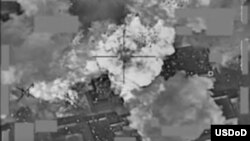Islamic State (IS) militants are transporting carloads of dollars from Iraq to their de facto capital city in Syria following U.S. airstrikes that destroyed millions in IS currency holdings, according to Iraqi and Kurdish officials.
The Pentagon has released several videos in recent weeks that U.S. officials say, show coalition aircraft bombing IS cash depots in Mosul, Iraq and nearby city of Ninevah.
After the January 11 bombing on an IS cash depot in Mosul, the terrorist group has stepped up the process of moving millions of dollars across the border to Syria, Iraqi and Kurdish officials told VOA.
Ghyas Surchi, spokesperson for the Patriotic Union of Kurdistan political party, told VOA that the U.S. airstrike on the Mosul depot was a “shock” for IS and torched millions of U.S. dollars and billions of Iraqi dinars.
Following the airstrike, IS arrested workers at the depot and executed four of them on the accusation that they leaked information on the location of the money, Surchi said.
According to Surchi, IS was in process of moving all of its financial assets to Raqqa, Syria, which it considered to be its capital - and safer. “IS now moves not only its money but also its other valuable assets from Mosul to Raqqa," said Surchi.
Money carrying cars
“IS has lost hope of holding Mosul for a long time,” Surchi said. “It knows it will lose it soon."
Kurdish and Iraqi forces, along with the coalition, were preparing an offensive to retake Mosul, but the timing was unclear, the Pentagon told VOA.
"Kurdish Peshmerga forces [military forces in Iraqi Kurdistan] from the north are only five to ten kilometers away from the center of the city and Iraqi forces from Ramadi and Tikrit are also close,” said Surchi.
Officials say IS is moving its financial assets to Raqqa via a supply route south of Mosul. The route crosses a desert plain known as al-Jazeera that has proven to be a viable pathway for the militants to move across borders.
After the Kurdish forces cut off a crucial IS supply route between Iraq and Syria in November 2015, IS created informal routes through the flat lands of southern Mosul to move fighters and supplies between Iraq and Syria.
Ismat Rajab, the head of Kurdistan Democratic Party in Mosul, told VOA that IS used civilian cars to move its cash from Mosul to Raqqa.
“The route from southern Mosul to Raqqa is mostly unpaved, but moving money is generally easy and wouldn’t require anything complicated,” said Rajab.
Cash strapped
Coalition airstrikes have hit IS war chests hard, according to the Iraqi, Kurdish and U.S. officials.
Separately, coalition and Russian airstrikes in recent months have targeted a variety of the group’s financial resources – including its once lucrative oil smuggling - making it difficult for IS to cover daily expenses.
“As we strike the [IS] cash, as we call it here in Iraq, we are going to see them react to our strikes,” U.S. Army Colonel Steve Warren said in January, “whether it’s storing their cash in smaller amounts, in multiple locations, or whether it’s moving it more often.”
The January airstrike on the IS depot in Mosul was so effective that the fighters were now imposing stricter taxes and money penalties on civilians as a means to collect funds, Kurdish and Iraqi officials said.
Qasim Hussein Barjis, a former member of the Iraqi parliament, told VOA that IS was in some instances allowing civilians to leave Mosul if they paid cash. Until recently IS rarely let anyone leave its territories. The terrorist group uses civilians as human shields.
“They take $1,500 for each adult and half of that amount for minors before they let them leave the city,” Barjis said.




